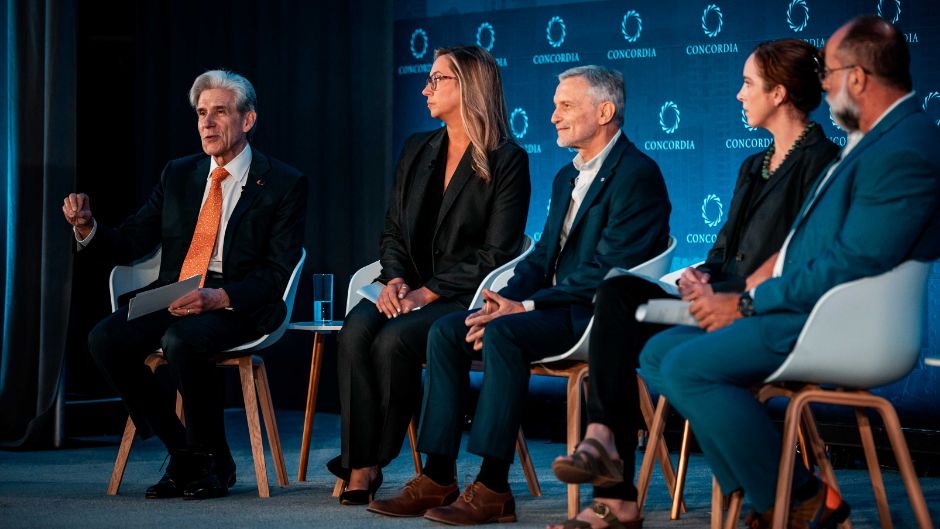With expertise in environmental law and immigration law, University of Miami Law faculty experts were invited to participate in the 2023 Concordia Americas Summit. This regional gathering was hosted for the second consecutive year by the University of Miami, which this year also served as principal programming partner.
Several former Latin American presidents, current legislators, U.S. officials, and leading private and public-sector innovators participated in the two-day event, consisting of fast-paced panels on climate change, misinformation, immigration, digital innovation, health care equity, and psychedelic medicine, among others.
Miami Law's Abigail Fleming, the Mysun Foundation practitioner in residence at the School of Law’s Environmental Justice Clinic, attended sessions that explored the intersections between health, climate science, technology, and democracy. She engaged with researchers, leaders, and students from the public, private, and philanthropic sectors. Her goal was to build connections with other researchers and advocates to create frameworks for complex problems.
"It was a great opportunity to engage with leaders and advocates from the Americas. I am confident it will lead to transformative partnerships," Fleming said.
While celebrating the progress being made to address climate change, Fleming emphasized the importance of addressing the structural inequalities that continue to be exacerbated by the threat and its consequences.
“There is absolute urgency and so many ways to do this. But first of all, we have to acknowledge the history of disinvestment in different populations,” she said. “If we don’t, there’s the risk of the same exploitation of those same harms.
“What we can do in the academy is to model collaboration,” Fleming said. “There needs to be a power shift and new frameworks so that we can come together to really seek true systemic change.”
Julio Frenk, president of the University of Miami, public health expert, and former Mexican health minister, said that the conference’s three dimensions—social function as a convener, geographic focus on the Americas, and priority of topics—mirrored those of the University.
Frenk moderated the session on “Climate Resilience’s ‘Ground Zero’: Miami Seas,” which featured University experts including Fleming.
Some of the topics being discussed here are absolutely crucial to our agenda of advanced education and research, democracy, and global threats,” said Frenk, adding that the erosion of trust—not only in institutions but also between people—was especially disturbing.
Alejandro Portes, research professor who teaches across the University’s School of Law and the College of Arts and Sciences department of sociology, shared his insights and research on Miami on the “Public Policy Perspectives: Sustainable Refugee Integration” panel.
The renowned sociologist cited Miami’s unique “historic receptivity and general attitude” toward immigrants, especially those from the Americas and Caribbean. He noted that the metropolitan area had accommodated 200,000 newcomers over the past year—a number that would have overwhelmed the existing services of most other cities.
“But the whole flow was entirely and invisibly absorbed by the local social capital network,” said Portes, referring to the support system of churches, organizations, and families that has welcomed waves of immigrants over the past decades.
More on Miami Law faculty in the news

